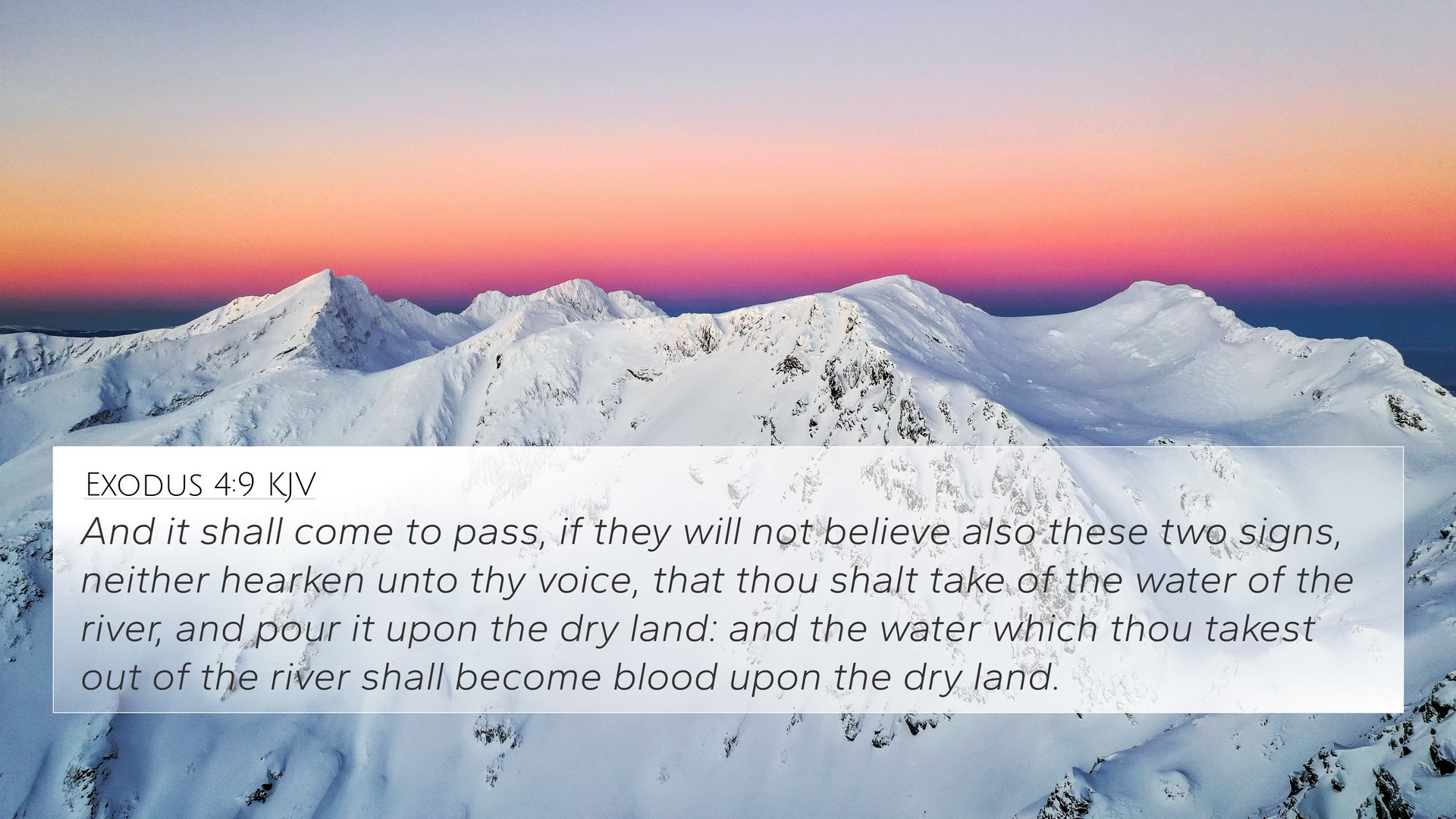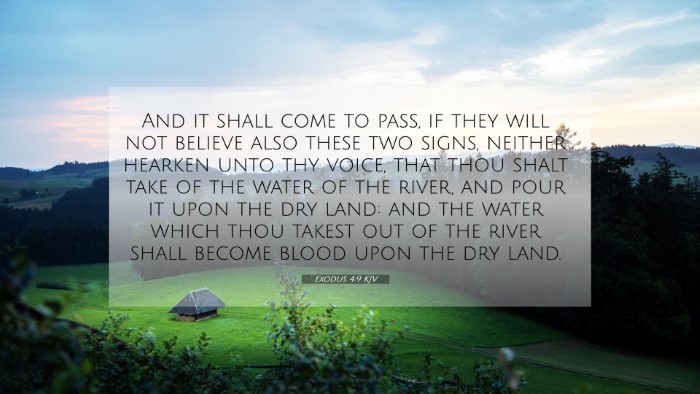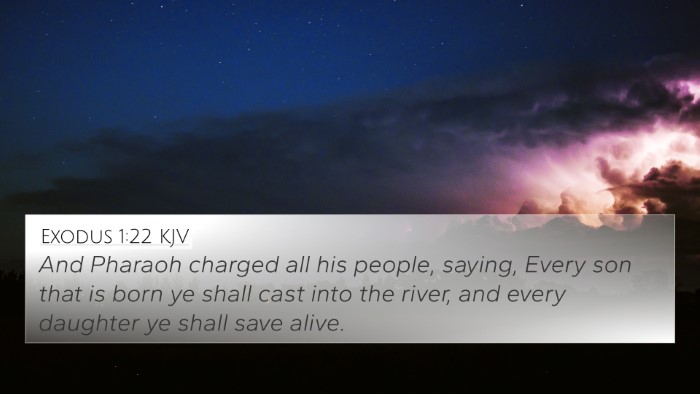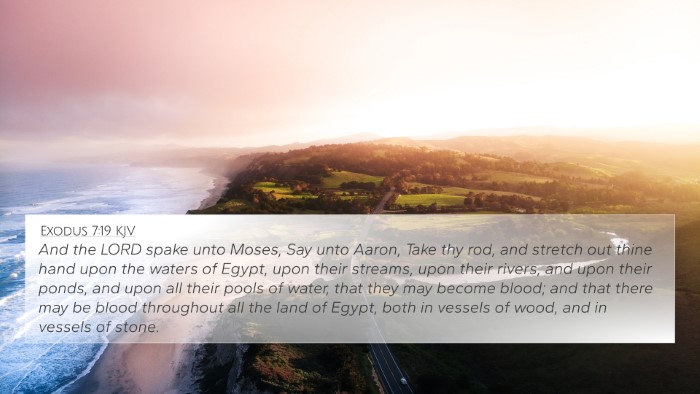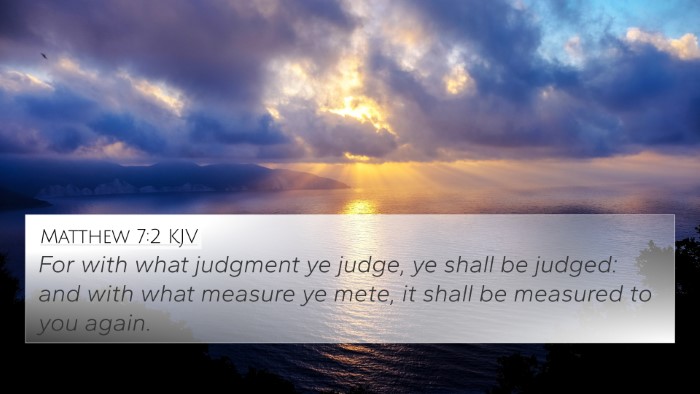Understanding Exodus 4:9
Exodus 4:9 states: "And it shall come to pass, if they will not believe also these two signs, neither hearken unto thy voice, that thou shalt take of the water of the river, and pour it upon the dry land: and the water which thou takest out of the river shall become blood upon the dry land."
Verse Analysis
This verse is pivotal as it highlights the signs that God endowed Moses with to demonstrate His power and validate Moses’ mission to deliver the Israelites from Egypt.
Significance of the Signs
- Divine Authority: God provides Moses with miraculous signs, showcasing His authority over nature, which reinforces Moses' leadership and prophetic calling.
- Invitation to Faith: The signs serve as an invitation for the Israelites to believe and follow Moses, which emphasizes faith as a necessary component for God's intervention.
- Consequences of Unbelief: The verse indicates potential outcomes; if the signs are rejected, further judgment (the water turning to blood) will come, symbolizing the seriousness of disbelief.
Commentary Insights
Matthew Henry’s Commentary
Henry emphasizes the profound implications of these signs, noting that while the first two signs (the rod turning into a serpent and Moses' leprous hand) were personal, the third sign concerning the river reflects the collective judgment against Pharaoh and Egypt for their oppression of Israel. He suggests that God's willingness to provide these signs illustrates His mercy.
Albert Barnes’ Notes
Barnes provides an exegetical perspective, clarifying that the act of turning water to blood illustrates the forthcoming plagues upon Egypt. He stresses the importance of the river Nile, which was central to Egyptian life, symbolizing God's power to disrupt the very source of their livelihood.
Adam Clarke’s Commentary
Clarke interprets the pouring out of the river’s water as an act of prophetic demonstration, serving to awaken the heart's awareness of sin and unbelief. He draws connections to the themes of repentance and warning throughout the scriptures, reinforcing that these signs were serious calls toward turning back to God.
Bible Verse Cross-References
Exodus 4:9 connects to several other scriptural passages, enriching its understanding through cross-references:
- Exodus 7:14-24: The plagues of Egypt, highlighting the water turning to blood as a judgment sign.
- John 2:1-11: Jesus turning water into wine, demonstrating divine authority over creation.
- Revelation 16:4-7: Apocalyptic imagery of water turning to blood as a sign of judgment.
- Isaiah 20:2: The call to prophetic signs and actions in obedience to God's direction.
- Matthew 17:5: God's testimony about Jesus, indicative of the importance of hearkening to His chosen servants.
- 2 Corinthians 2:16: Apostle Paul speaks of the aroma of Christ, relating to belief and acceptance of God's message.
- Hebrews 11:29: The faith of the Israelites in crossing the Red Sea as a sign of belief in God's deliverance.
- Psalms 78:44: Reminds of God’s miracles in Egypt, pointing to His power displayed through signs.
- Acts 7:36: Stephen recounts Moses and the signs as evidence of God’s workings among His people.
- 1 John 5:10: The importance of believing in the testimony of God, which resonates with the call to faith in Exodus.
Connections between Biblical Texts
Understanding Exodus 4:9 within the broader biblical narrative reveals thematic connections:
- God's persistent desire for His people to believe in Him despite numerous signs and wonders.
- The relationship between faith and miraculous signs, as seen in the New Testament with Jesus and His disciples.
- The recurring theme of judgment being connected to the rejection of God's messages, seen throughout both Old and New Testaments.
Thematic Bible Verse Connections
This verse exemplifies several prevailing themes:
- Signs and Wonders: Throughout scripture, acts of divine intervention serve to affirm God’s authority.
- Reflection of Human Response: The willingness or reluctance of people to respond to God’s signs affects their relationship with Him.
- Justice and Mercy: God’s signs often reflect both His justice against sin and His mercy in offering chances for repentance.
Interpreting Biblical Themes through Cross-References
Utilizing cross-referencing methods when studying Exodus 4:9 can illuminate broader themes, including:
- Understanding God's sovereign control over creation and history.
- Exploring parallels between Old Testament prophecy and New Testament fulfillment through Christ.
- Identifying how God communicates with His people through signs, requiring discernment and response.
Bible Cross-Reference Guide
For individuals seeking deeper understanding, utilizing tools for bible cross-referencing can greatly enhance their study experience. Consider the following:
- Bible concordance for finding related verses.
- Bible cross-reference systems available in various study Bibles.
- Resources for contextual understanding, allowing for a comprehensive analysis of scripture.
Conclusion
In summary, Exodus 4:9 serves as a significant reminder of God’s power and the necessity of faith. Through understanding the context and examining bible verse cross-references, believers gain insight into God’s character and His continuous call to respond in faith.
